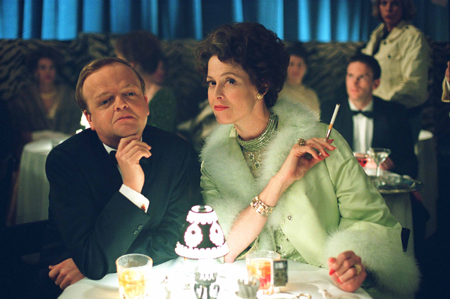|
Reviews of Recent Independent, Foreign, & Documentary Films in Theaters and DVD/Home Video
Written & Directed by: Douglas McGrath, based on the book by George Plimpton. Produced by: Christine Vachon, Jocelyn Hayes, & Anne Walker-McBay. Director of photography: Bruno Delbonnel. Edited by: Camilla Toniolo. Music by: Rachel Portman. Released by: Warner Independent. Country of Origin: USA. 118 min. Rated: R. With: Toby Jones, Sandra Bullock, Daniel Craig, Peter Bogdanovich, Jeff Daniels, Hope Davis, Gwyneth Paltrow, Isabella Rossellini, Juliet Stevenson, Sigourney Weaver, John Benjamin Hickey, Michael Panes, & Lee Pace. Not since Valmont followed on the heels of Dangerous Liaisons has there been such a fascinating compare/contrast double feature. There is no way not to recall last year’s Capote, as Infamous covers almost exactly the same territory (let’s face it, it’s great material). In 1959, an article in The New York Times about the slaughter of a rural Kansas family caught the attention of the writer of Breakfast at Tiffany’s. Truman Capote then traveled to Kansas to explore the effects of the killings where they took place, Holcomb, KS. The result was his nonfiction bestseller that reads like a novel, In Cold Blood. Although many of the films’ scenes practically mirror one another, there’s no way to mistake the difference in tone. From start to finish, director Bennett Miller’s Capote is somber and almost meditative, though there are the inevitable sparks from life-of-the-party Capote. Bennett took his time, especially in depicting the author’s sexually ambiguous relationship with killer Perry Smith. Infamous director Douglas McGrath’s script is an anecdote-filled yarn, much like what Capote would have confided to one of his swans, the beautiful matrons of New York high society he cultivated. Matching this portrayal of Capote is Deborah Davis’ 2006 book Party of the Century, where he was both their confidant and court jester. And in the film’s first half, a fish-out-of-the-water farce, the diminutive and fey Eastern writer is repeatedly mistaken for a woman numerous times. So it is possible that Infamous may hold one’s attention more consistently, but subtlety is lost along the way. With quiet confidence, last year’s Capote, Philip Seymour Hoffman, could effortlessly steal the spotlight. The elfish Toby Jones’ portrayal, as it is both written and performed, strives to ingratiate himself. This is most apparent after he and his childhood friend, Nelle Harper Lee (Sandra Bullock), have been invited to Christmas dinner with the family of Alvin Dewey (Jeff Daniels), the lead investigator of the murders. Capote wears down the Midwesterners’ resistance to his flamboyance by shamelessly name dropping Humphrey Bogart, Jennifer Jones, and Ava Gardner. Capote wins the friendship of Dewey, bragging that he once beat Bogey at arm wrestling before letting the sheriff’s strapping teenage son beat him. Dan Futterman’s Capote screenplay now seems more and more self-assured, avoiding clunky exposition (the bane of biopics). Nowhere is the difference more clear than in the dance of death between author and Smith. After Smith’s arrest, both films feature his perp walk into the county jail before the eyes of the silent community. The Smith of Infamous momentarily stops in his tracks and locks eyes with Capote, who is among the spectators. What is implicit in last year’s version is explicit here. In Capote, the loneliness of the two men was palpable. But at a more clipped-pace, Infamous’ evolving game of cat and mouse between an ambitious writer and his subject is passionlessly perfunctory.
Unfortunately, the rushed quality carries over into many of the performances, either for the lack of rehearsals or the sketchy
writing quality. All of the swans, Sigourney Weaver, Hope Davis, and Isabella Rossellini, are resplendent in their Chanel and
Pucci haute couture, but they are always poised as though presiding over one long cocktail party. It would be hard to believe
that any of them would let their hair down at the Colony and talk down and dirty. Juliet Stevenson, as Diana Vreeland, is
particularly over the top, even in her interview segments, which, like those of Capote’s other friends and colleagues, are interspersed throughout. An out of place cameo with Gwyneth Paltrow as a café singer almost stops the film before it gets started. Singing “This Thing Called Love,” she breaks down mid-song, a weak foreshadowing of Capote’s relationship with Smith. However, Sandra Bullock, in a pleasing stretch from her leading lady roles, strides into character actor territory. Without grandstanding, she walks with a wide stance in a shapeless overcoat as the voice of reason in sensible shoes.
Kent Turner
|

